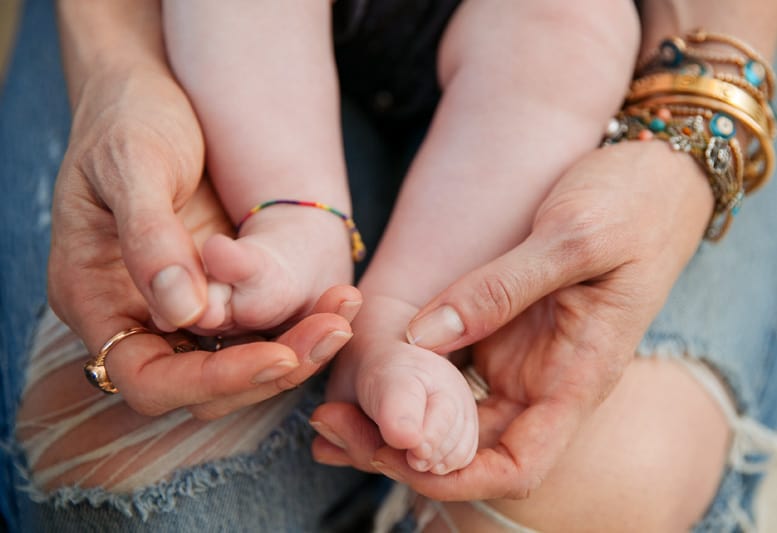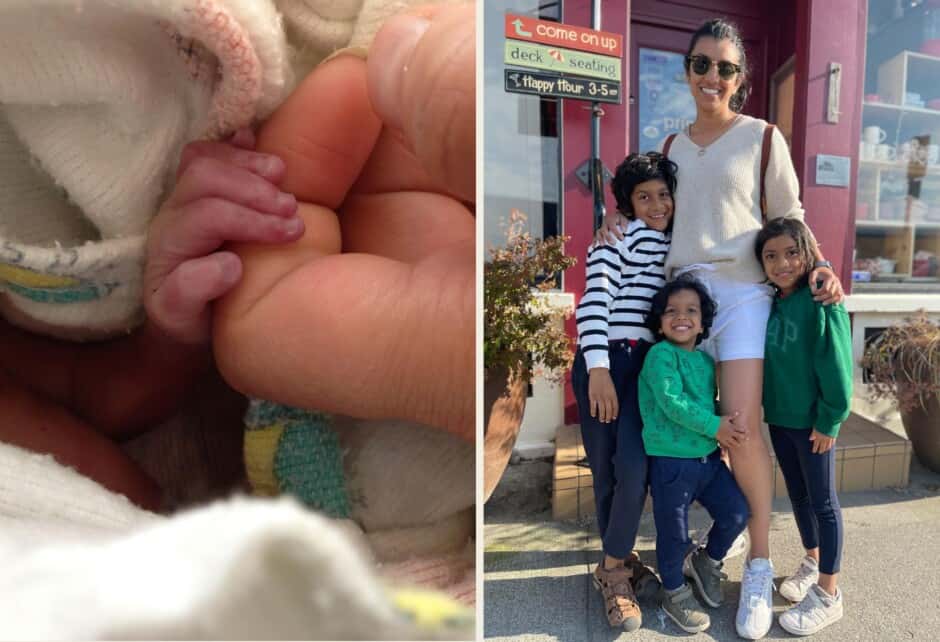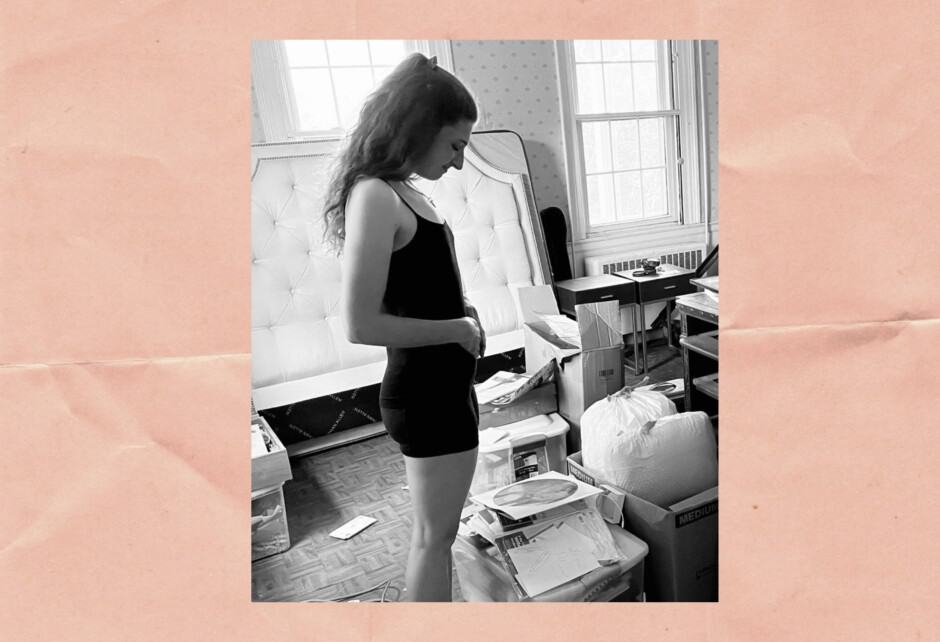
Mom Talk: Boob Doom & A Baby Nurse
Written by Elspeth Keller
Photography by Simone Harouche, Photographed By Jesse Chamberlin
We’re back with another round of “Mom Talk”, where we invite some incredible mothers, from all walks of life, to share their personal experiences and journeys through motherhood, whether it be struggles, triumphs, or anything in-between—nothing’s off limits when it comes to topics. This week, Elspeth Keller shares a personal and deeply touching essay on her journey through the first few weeks of motherhood, including her struggles breastfeeding and the unexpected companionship she found in her night nurse. -JKM
In the hospital, my son Conrad latches perfectly. My milk comes in ahead of schedule. And, Conrad eats like he was born to do it. It’s how I assumed it would be: easy, natural, and making Mother Nature proud. I’m aware there are breastfeeding books, classes, and support groups, but I can’t really imagine why. It is a time of innocence; I have no idea what kind of booby doom is in store.
Despite my early success with breastfeeding, I am, of course, bleary-eyed. Extreme fatigue, just like two dirty martinis, can make a person irrational, wobbly, and mean. Safe to say I am over the legal limit of fatigue-drunk when Davy, the baby nurse we’d hired when I was five-months pregnant, arrives at our home six days after Conrad is born. Like any new mom, I haven’t really slept since the C-section; my body is an eggshell, desperately puttering along on adrenaline fumes and sporting a sweet, post-baby tire around the middle like a floatation device.
Davy is a small 57-year-old woman from Trinidad and Tobago with a thick Caribbean accent. She calls everyone, and I mean everyone—my husband Reid, me, and our 13-year-old pit bull, Bella—“pumpkin pie.” When I conversationally ask her where her husband works, she says, “Ikea and You-bah.” I ask again, where? “You-bah.” Ummm…You-bah. Oh! Uber. So it goes with many of our interactions. Obviously we didn’t hire Davy because we had perfect communication, but because it’s clear this woman is the Meryl Streep of baby nurses. Her destiny is baby nursing, and it’s fun to watch her do it. Her confidence, ease, and the way she refers to all the (hundreds of) newborns she’s worked with as “my babies” feels like a warm, comforting, Caribbean breeze. It’s hard to believe that on her first night, I want to send her away.
We’d signed a contract with Davy to come for six weeks, 7 p.m. to 7 a.m. It’s a hefty expense, but with our families up north or back east, respectively, we knew we’d need some help to feel grounded in our roles as new parents. And, anyone who’d had a baby night nurse told us, “You’ll want her for at least three months,” or “It’s the best money you can spend,” or “If you don’t have a night nurse, you will die of exhaustion, but not before murdering your spouse.”
Night one, Davy comes through the door in brightly colored nursing scrubs and almost immediately lays out the schedule. Conrad is to eat every three hours. It’s important that he eats for a full forty minutes—a full feeding—so, essentially he’s eating every two hours. If he’s crazy hungry, it’s okay to feed him fifteen or twenty minutes early, but “try to stretch him.” I am to pump in between feedings, twice a day, and once in the middle of the night. Reid dutifully writes down Davy’s schedule as the back of my throat and nose begin to sting like crazy, and I focus hard on holding back tears. Then, much to his confusion, I pull Reid into my office and let them rip.
“I don’t know if I can do this,” I exclaim. “Okay…?” He looks at me. But, my tears have nothing to do with the frequency of feedings and pump sessions. I understand that there is no avoiding a schedule that’s one big blur of lactose expression and consumption. Our doula, Erica, warned me in our last meeting: breastfeeding is a full-time job. That doula didn’t lie. The thing is: I’m not interested in sharing the job. I’ve been on 24-7 Conrad watch for six days, and I’m doing just fine, thank you very much. I want to feed him. I want to be with him in the night. Everyone else stand the fuck back! With the tears, I feel this intense lion mane growing, and a roar welling up in my chest. The schedule, the opportunity to get more sleep—these were all things that previously seemed worth paying for. More than three hours of sleep with a newborn is a huge gift! And, a schedule? A blessing! But, this new mane requires something different. I want to stalk around Conrad in a circle, glare at anyone who glances at him, and lick him on the head. At this point, it’s safe to say I’m making sense to no one, including myself.
Reid talks me down. “Should we just try it tonight?” The idea of enduring another woman taking care of Conrad during the night for six weeks sounds like, “How about giving him up for adoption?” Reid is right to suggest starting with the next twelve hours, which still pierces me through the heart. We have a contract, and more importantly, we have what I’d thought were very good intentions. I’d read Baby Wise, and I was convinced that its thesis of Parent Directed Feeding, or feeding on a pliable schedule, was sound. Although the hospital sends you home advising feeding on demand, and many parents feel that this is the only way, Baby Wise made sense to me. It would help to make the strange chaos of a newborn a tiny bit more predictable. I’d also heard ad nauseam that babies love routine and getting him on a schedule, giving him that routine, felt like the right thing for our family. But, putting these great ideas into practice was a different beast.
I agree to try Davy for one night. I dry my eyes and let her teach me how to use the breast pump, which feels a little like learning how to use a tampon; a tool near a sexual body part, but in this case, not stopping a flow, but starting one. A lot of milk comes out, enough for the night shift, and Davy tells me to go to bed. I’m sure that I’ll never be able to sleep, but I’ll humor her and try. When I awake, it’s six in the morning and I’ve slept entirely through the night. The post-baby tire around my middle seems to have deflated dramatically. I still feel like a lion, but a much tamer one.
I let Davy come the next day, and the next day, and the next one after that. In the afternoons, I begin to look forward to seven o’clock because it will mean some relief. On days when Conrad is particularly ornery, he’ll be wailing as Davy comes through the door and she’ll declare, “Tell me what dey done to ya!” Then laugh, laugh, laugh. Having the pro around puts us all at ease.
I still possessively nurse Conrad every evening before he goes to sleep, while Davy sits in the nursery with us and I ask her questions. If breastfeeding is a full-time job, I realize she is my consultant—an expert brought in at the most critical moment. During these simple days, we cover easy topics: baby butt cream, infant bathing, how to pack the diaper bag to be prepared for any bodily fluid explosion. As I’m nursing, Davy reminds me to be constantly drinking a glass of water. We talk about sleeping, giving the baby a small moment, an opportunity to sooth himself when he wakes in the night. I watch her be a total neat-freak around newborn Conrad, much to my delight despite the copious laundry. We discuss Conrad’s gas (caused by the breast milk) and how there’s really nothing I can do about it; Conrad’s occasional pimples and how they are caused by my hormones (in the breast milk, but if you put breast milk on them, it helps); and Conrad’s extreme cuteness (which actually has nothing to do with breast milk). When we’ve covered all baby-related topics, I get to know Davy. I learn about her village and her parents’ divorce. I find out that she hates chicken, but loves coffee. I ask her about her nine siblings, four children, and two husbands. It’s not long before we’re in a nice routine. I can understand everything she’s saying (fine, 90%), and I begin to believe that I am indeed a pumpkin pie.
Two to three weeks in, I’m still dead tired, and I’m often feeling a bleakness I’d hoped the placenta pills would help me avoid. I suspect it’s baby blues when regular thoughts feel acid-washed with sadness. I sink into a feeling that my prime is over because I’ve procreated and now it’s just about aging, while watching my child move away from me. My love for Conrad feels heavy and unbalanced and like it will break me. I tear up, hoping it’s temporary. I also understand that as a new mom I’m supposed to be tired, but I’m the kind of tired where the only way I can get up in the morning is if I tell myself, “Don’t worry honey, we’ll get you a nap soon.” A bold faced lie. This false nap promise continues all day, but I reason that even with Davy covering my night shift, because I’m getting up in the night to pump and rising before the sun to feed Conrad–and being a fun person who needs eight hours–it makes sense to be so drained. If breastfeeding is a full-time job, Conrad is my demanding boss who communicates via screaming and doesn’t give a flying fuck how many hours we’re into overtime. But, how tired is the right amount tired? And, when do the baby blues dissipate? And, at what point should I think the words “postpartum depression”?
I have no point of comparison or way to know if I’m being sad or tired correctly. It’s the same with my milk. I know I have a lot of milk, and sometimes when I mention this to other moms, they say, “I had a lot of milk too!” But, I’m just not sure if we are talking about the same thing? My milk sprays the walls. My milk-absorbing bra inserts need to be changed three times a day. It’s bordering on freakish. Erica tipped me off that after nursing, the breasts should feel soft and jiggly again. My breasts are never jiggly. They look fake, and the smell of souring milk on every surface is very, very real. Additionally, right after feeds, Conrad is often spitting up large quantities and fussing wildly. Could he be getting too much to eat? Is that even a thing?
Obviously, I’m distinctly in a place of more questions than answers, but through this milk-soaked fog, it slowly dawns on me that the fatigue that won’t let go is peaking during feedings. In fact, any time my milk lets down—which seems like always—a consistent wave of melancholy followed by fatigue has become the norm, which is abnormal. Oxytocin, the love hormone, is typically released during breastfeeding, but it’s official: I’m not feeling the love. I’m feeling the blues.
While nursing, I start to investigate my unusual reaction to breastfeeding via one thumb and an iPad. An Internet search turns up something called D-MER (Dysphoric Milk Ejection Reflex—sexy), which explains my symptoms to the letter. It describes “an inappropriate” drop in dopamine just prior to the milk ejection reflex resulting in an emotional reaction ranging from restlessness to dread. D-MER is not postpartum depression, and it’s only been a documented thing since 2008. The site I find suggests hydration and rest, and says that about half the time, D-MER goes away on its own. It feels better to have an answer, to push baby blues and postpartum depression into the “probably not” column. But, man, how many different varietals of gloom can one bundle of joy potentially bring? Wait, though, there’s more.
Davy is old-school. She’s never heard of D-MER and she does not want to hear about me eating my placenta. As her finite weeks with us stack upon themselves, she further earns her (metaphorical, yet literal) consulting fee when she notices a pinkness on one of my breasts and warns me that it might be mastitis, which I’ve never heard of, but know it can’t be good because it ends in “itis”. My thumb-iPad research reveals that mastitis is a clogged milk duct that causes an infection in the breast and leads to the owner of the breast getting fever, chills, and a real sore boob (literally, not a jerk who’s mad in the ’50s). It’s typically treated with antibiotics. Other home remedies include massaging the breasts with hot water in the shower, combing the boobs, taking a vibrator to the clogged area, or covering the breasts with cold cabbage leaves, which quickly makes a person smell like a restaurant with a “B” rating in the window. I try all these things until my fever spikes, and I make a doctors appointment.
As I sit in Dr. Aliabadi’s office waiting for her in a paper vest, I quickly soak the front with milk. This hyper-lactation is not shy. Most other moms respond to this with, “Lucky!” Much more common is underproduction, and I can imagine how demoralizing that might be. The worry of your baby not getting enough to eat would be all-consuming. The unfair feeling of inadequacy might creep in. Later, in my “Mamas + Babes” group, I would hear another mom say, “I felt like I was starving him,” and start to cry. For such a “natural thing”, breastfeeding can go wrong in so many ways. There should be support groups for this! Oh, wait.
Aliabadi explains that mastitis often strikes if a mother abruptly stops breastfeeding (or just feeds less), or is totally worn down. But, I haven’t taken any time off from breastfeeding and I’m lucky enough to have help at night. We deduce that I’ve just got more milk than Conrad can handle, so it’s built up and begun to fester. What’s more, D-MER is most often found in women with an oversupply. My question and answer columns are beginning to even out; the hyper-lactose seems to be the apex of a triangle of boob doom with D-MER and mastitis. So, while it’s true I am lucky to have plenty to feed my baby, here I am in my doctors’ office with a sad attitude, a fever, and a soaking wet paper vest. Perhaps, much like money, it’s mo milk: mo problems.
If breastfeeding is a full-time job, my boobs have become my co-workers. Before, they were just breasts, but now they are characters in the story. Ironically, they’re looking the best they’ve ever looked: massively full, round, and always at attention, but wildly moody and high-maintenance. They’re like hot girls. I don’t want them to go anywhere, but I want them to be easier to deal with. I name them Gigi and Bre and look at them in the mirror.
I think about not breastfeeding. I think about throwing in the towel and switching to formula. I don’t have anything to prove as a breastfeeding mother; it feels completely personal. I have no judgment toward women who don’t, and I feel no need to post a photo of my child on my teat on social media. But, there are a few things that make me keep going. I want Conrad to get the antibodies. I want them to protect him from things we can’t see, while I protect him from things we can. Erica tells me the breastfeeding will get better. She says around six weeks, it will even out. And, I also want my old body back, and I understand that breastfeeding burns up to five hundred calories per day. So, I resolve to keep going for the sake of my waistline, a better future, and tiny, powerful, protective blood proteins being constantly pumped into my son.
One evening, while feeling sorry for myself and angry at Gigi and Bre, my conversation with Davy takes a dark turn. As I nurse Conrad, she tells me the story of losing her youngest son when he was nineteen. It was Carnival back in Trinidad, and a bullet bounced off a post and ricocheted into his brain. Needless to say, she fell into the worst kind of darkness. I hold Conrad closer and tell her how sorry I am. Suddenly, my sadness has a reason. The D-MER melancholy is cotton candy sadness; it’s artificial, inappropriate, and my son is still in my arms. The mastitis is a fever—it’s chills—but my son is still in my arms. Davy’s son was quiet, polite, and never did drugs. She explains it was the tragedy of losing him that brought her to babies. In her depression, she found babies were the only way out—a purpose she could keep living for, her real life’s work.
During Davy’s sixth week, she brings me energy tea in a fuchsia box and gives me the name and number of a nanny agency. “You two can’t do it alone, das why dey get depressed.” She claims that it’s too hard to raise a child around the clock without help. I know she works for some people on twenty-four hour jobs by herself, so she can do it, but she’s Streep. I’m not worried that she’s going soon because I’m stronger. The mastitis has been handled, and I’ve isolated the melancholy by understanding that it’s D-MER, and it’s not me. I think of D-MER as that friend who always comes over with a dramatic sob story; I listen, but it’s not my life.
On Davy’s last morning, I’m almost as emotional as I was on her first night. It strikes me that Conrad will never remember this woman who helped him and us during the most helpless and delicate time of his life. He was one of “her babies”, but will only know it through aural history, a couple of photographs, and perhaps a vague fondness for a Trinidad and Tobagian accent. As Davy kisses Conrad goodbye in the morning light, she becomes legendary before my eyes. Her strength and her lessons are sacred. While she still stands there, I miss her profoundly. And then, almost as swiftly as she arrived, the Caribbean breeze is gone.
Are you a mom with something to say? Send us an email to be considered for our “Mom Talk” column.
Share this story



